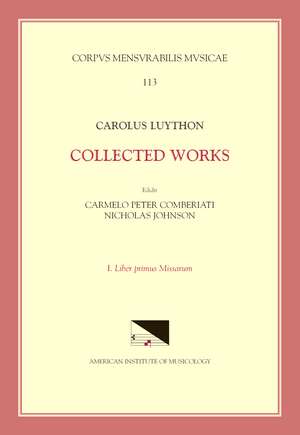CMM 113 CAROLUS LUYTHON (ca. 1586-1630), Collected Works, edited by Carmelo Peter Comberiati and Nicholas Johnson, Vol. 1. Liber primus Missarum: Corpus Mensurabilis Musicae, cartea 113
Editat de Mel Comberti Autor Carolus Luythonen Limba Engleză Paperback – 31 dec 2016
Carolus Luython (ca. 1557—1620) spent most of his career as organist and composer at the Habsburg Imperial court in Vienna and Prague in the chapels of the Holy Roman Emperors Maximilian II and Rudolf II. His work is representative of the techniques of the late Renaissance, including examples of the expanded harmonic palette, as well as the alteration of imitative counterpoint and post-Palestrinian homophonic textures typical of the Counter Reformation. Luython is known for his instrumental works for keyboard, the well-documented conflict he had with Albrecht Rudner in the rebuilding of the Prague Cathedral organ between 1581 and 1590, and for his “clavicimbalum universal,” which after a visit to Luython, Michael Praetorius described in Syntagma Musicum, vol. 2, De Organographia (Wolfenbüttel: Elias Holwein, 1618) as having nineteen notes to the octave. Luython’s major published vocal works comprise most of his oeuvre and include a book of five-voice madrigals on texts by Petrarch (Venice: Angelo Gardano, 1582), a collection of six-voice motets (Prague: George Nigrinus, 1587), a collection of six-voice sacred songs (Prague: George Nigrinus, 1603), a six-voice set of Lamentations for the Prophet Jeremiah (Prague: George Nigrinus, 1604), and a book of nine polyphonic Mass Ordinaries for three to seven voices (Prague: N. Straus, 1609). His works represent a broad cross section of genres in Vienna and Prague and how the tastes of these important Northern courts for Italian musical models was realized locally at the highest level and rewarded. Luython's last published music, the Liber primus Missarum (Prague, 1609), contains nine polyphonic settings of the Ordinary of the Mass, which demonstrate cantus firmus and parody techniques based upon significant sacred and secular models available to the chapel. The collection pays homage to Luython’s mentor, Philippe de Monte, in the parody works and to Emperor Rudolf II in the seven-voice dedication Mass based upon a non-liturgical text that could represent a hermetic synthesis between astrological and mystical elements that were current in court culture. The collection also includes four settings identified as Quodlibet Masses by Luython, which were derived from unidentified models and constructed in a technique similar to the parody masses. For more information, see http://www.corpusmusicae.com/cmm/cmm_cc113.htm
Din seria Corpus Mensurabilis Musicae
-
 Preț: 405.50 lei
Preț: 405.50 lei -
 Preț: 529.92 lei
Preț: 529.92 lei - 23%
 Preț: 548.60 lei
Preț: 548.60 lei - 23%
 Preț: 666.69 lei
Preț: 666.69 lei - 23%
 Preț: 477.79 lei
Preț: 477.79 lei -
![CMM 10 FRANCHINUS GAFURIUS (1451-1522), Collected Musical Works, edited by Lutz Finscher. Vol. I [Masses: Missa De Carnival, Missa Sexti toni irregularis]](https://i2.books-express.ro/bs/9781595510372/cmm-10-franchinus-gafurius-1451-1522-collected-musical-works-edited-by-lutz-finscher-vol-i-masses-missa-de-carnival-missa-sexti-toni-irregularis.jpg) Preț: 155.09 lei
Preț: 155.09 lei - 27%
 Preț: 808.92 lei
Preț: 808.92 lei - 27%
 Preț: 741.96 lei
Preț: 741.96 lei - 27%
 Preț: 697.27 lei
Preț: 697.27 lei - 27%
 Preț: 922.37 lei
Preț: 922.37 lei - 27%
 Preț: 988.38 lei
Preț: 988.38 lei - 27%
 Preț: 887.40 lei
Preț: 887.40 lei - 27%
 Preț: 888.17 lei
Preț: 888.17 lei - 23%
 Preț: 582.02 lei
Preț: 582.02 lei -
 Preț: 374.50 lei
Preț: 374.50 lei - 23%
 Preț: 594.20 lei
Preț: 594.20 lei - 23%
 Preț: 642.26 lei
Preț: 642.26 lei - 27%
 Preț: 966.67 lei
Preț: 966.67 lei - 23%
 Preț: 689.78 lei
Preț: 689.78 lei - 23%
 Preț: 642.26 lei
Preț: 642.26 lei - 27%
 Preț: 743.06 lei
Preț: 743.06 lei - 23%
 Preț: 690.62 lei
Preț: 690.62 lei -
 Preț: 497.82 lei
Preț: 497.82 lei - 27%
 Preț: 1232.45 lei
Preț: 1232.45 lei - 23%
 Preț: 663.37 lei
Preț: 663.37 lei - 23%
 Preț: 558.44 lei
Preț: 558.44 lei - 27%
 Preț: 714.06 lei
Preț: 714.06 lei - 23%
 Preț: 651.01 lei
Preț: 651.01 lei - 27%
 Preț: 854.21 lei
Preț: 854.21 lei - 27%
 Preț: 719.64 lei
Preț: 719.64 lei - 23%
 Preț: 597.46 lei
Preț: 597.46 lei -
 Preț: 467.38 lei
Preț: 467.38 lei - 23%
 Preț: 690.94 lei
Preț: 690.94 lei -
 Preț: 186.25 lei
Preț: 186.25 lei - 23%
 Preț: 576.33 lei
Preț: 576.33 lei -
![CMM 18 JOHANNES TINCTORIS (ca. 1453-1511), Opera Omnia, edited by Fritz Feldmann. Vol. I Missa 3 vocum [Dedicated to Ferdinand, King of Sicily and Aragon]](https://i4.books-express.ro/bs/9781595510549/cmm-18-johannes-tinctoris-ca-1453-1511-opera-omnia-edited-by-fritz-feldmann-vol-i-missa-3-vocum-dedicated-to-ferdinand-king-of-sicily-and-aragon.jpg) Preț: 155.46 lei
Preț: 155.46 lei - 23%
 Preț: 501.85 lei
Preț: 501.85 lei - 23%
 Preț: 633.47 lei
Preț: 633.47 lei - 23%
 Preț: 454.61 lei
Preț: 454.61 lei -
 Preț: 247.51 lei
Preț: 247.51 lei -
 Preț: 436.71 lei
Preț: 436.71 lei -
 Preț: 375.51 lei
Preț: 375.51 lei -
 Preț: 278.20 lei
Preț: 278.20 lei -
 Preț: 284.90 lei
Preț: 284.90 lei -
 Preț: 344.85 lei
Preț: 344.85 lei -
 Preț: 436.93 lei
Preț: 436.93 lei -
 Preț: 375.51 lei
Preț: 375.51 lei -
![CMM 24 GIACHES DE WERT (1535-1596), Opera Omnia, edited by Carol MacClintock (secular music) and Melvin Bernstein (sacred music). Vol. XVI [Motets] (Modulationum cum sex vocibus, liber primus, 1581)](https://i0.books-express.ro/bs/9781595510808/cmm-24-giaches-de-wert-1535-1596-opera-omnia-edited-by-carol-macclintock-secular-music-and-melvin-bernstein-sacred-music-vol-xvi-motets-modulationum-cum-sex-vocibus-liber-primus-1581.jpg) Preț: 467.63 lei
Preț: 467.63 lei -
 Preț: 319.65 lei
Preț: 319.65 lei
Preț: 1000.58 lei
Preț vechi: 1370.65 lei
-27% Nou
Puncte Express: 1501
Preț estimativ în valută:
191.49€ • 199.18$ • 158.08£
191.49€ • 199.18$ • 158.08£
Carte indisponibilă temporar
Doresc să fiu notificat când acest titlu va fi disponibil:
Se trimite...
Preluare comenzi: 021 569.72.76
Specificații
ISBN-13: 9781595515179
ISBN-10: 1595515178
Pagini: 320
Dimensiuni: 241 x 349 x 28 mm
Editura: American Institute of Musicology
Colecția American Institute of Musicology, GmbH
Seria Corpus Mensurabilis Musicae
ISBN-10: 1595515178
Pagini: 320
Dimensiuni: 241 x 349 x 28 mm
Editura: American Institute of Musicology
Colecția American Institute of Musicology, GmbH
Seria Corpus Mensurabilis Musicae
Cuprins
Acknowledgements viii Abbreviations ix Literature x Luython's Career in the Context of the Imperial Court (Comberiati) xv Biographical Background xv The Liber primus Missarum of 1609 xv The Dedication Mass xix Parody Masses Mode
